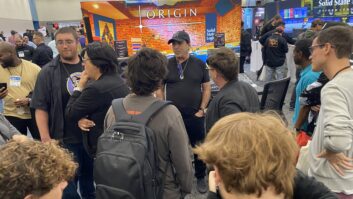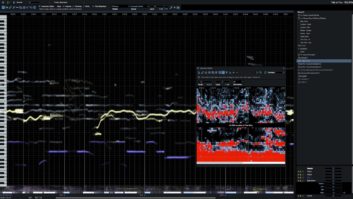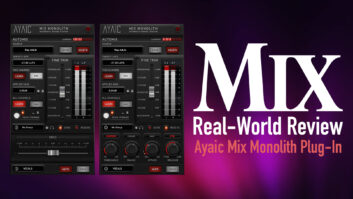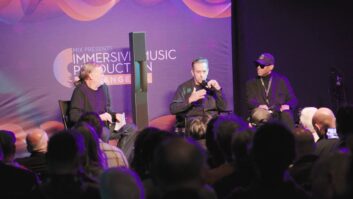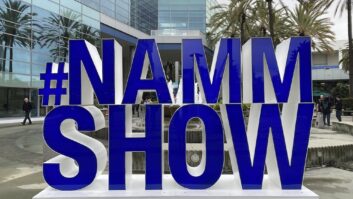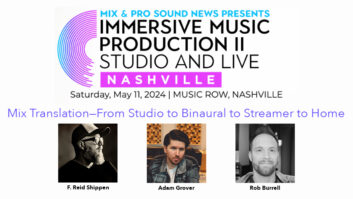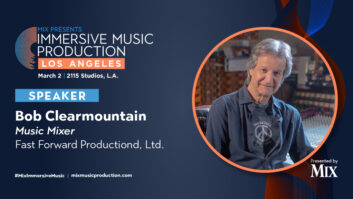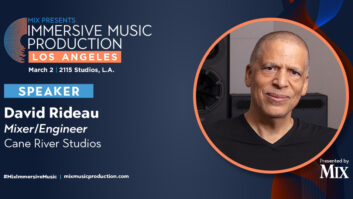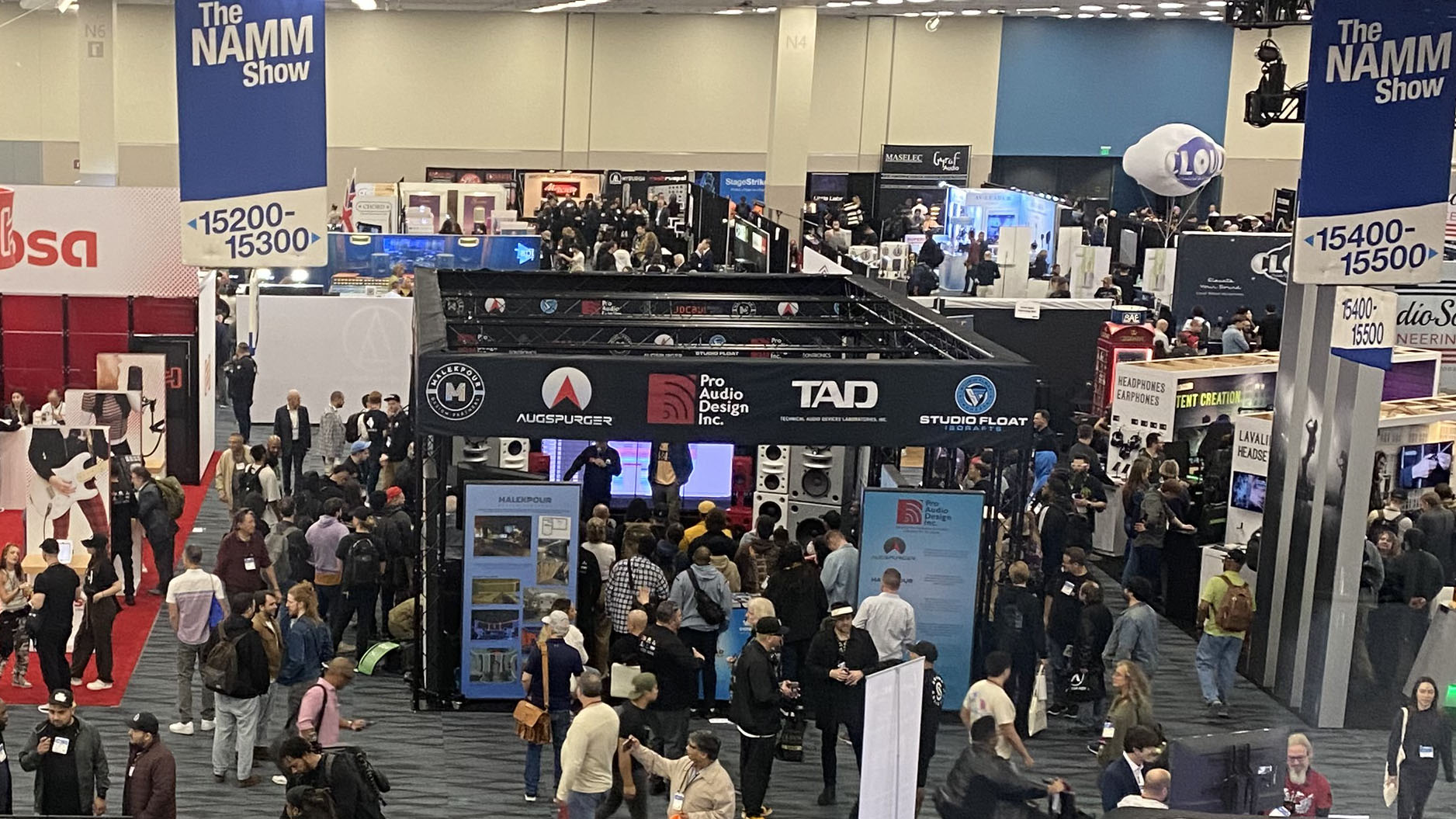
Immersive audio was everywhere at NAMM, from product introductions in the booths to expert panels in the second-floor rooms, from detailed listening sessions in 9.1.6 spaces, hosted by A-list engineers, to the debut of a new Atmos mis studio inside the John Lennon Educational Tour Bus. Just a couple of days before NAMM opened, Apple Music announced that it would pay a higher percentage in royalties for downloads/streams of Spatial mixes.
Sony brought even more this year, with VME and headphone displays, and even more engineer presentations on 360RA; Genelec set up a 7.1.4 system in one of the rooms ringing the first floor and showcased its new UNIO monitoring platform and 8381A point-source speakers; Voyage Audio showed a new version of the eight–capsule 2nd order Ambisonics Spatial mic; RME Fireface touted its Atmos capability; Avid had its Pro Tools Atmos Renderer front and center; and Sennheiser/Neumann took over two rooms up on the second floor of North Hall, with one side for Dear Reality, AMBEO, headphones, and the range of tools, and the other room tricked out with a tuned 9.1.6 Neumann KH Series Atmos system for running hosted listening sessions all day long.
There were many more examples, both studio and live, throughout the show, and it felt like the music/recording industry has finally turned a big corner in the adoption and acceptance of immersive music production.
Which brings me back to the end of Part 1, at 5 o’clock on Thursday, January 25, walking to the PMC booth for Happy Hour…
PMC: The Immersive Music Sweet Spot
There’s a reason the PMC booth at NAMM has become something of a hub for those who want to talk about or learn more about immersive music. Over the past five or six years, Maurice Patist, who heads up PMC in the States, and his team have done more than anyone I can think of to boost the public profile of Atmos in the recording industry, often in conjunction with Dolby and Capitol/UMG.
The 2019 PMC-Dolby Atmos booth, a large, enclosed room on the show floor with a sweet-sounding 7.1.4 system, was something entirely new. Quiet, wth a door. A whole new experience, and it sounded awesome! Song menus were placed on each chair, and Capitol mix engineer Steve Genewick played them back on request. I can’t tell you how many engineers since then have told me about how that experience inspired them to go out and learn more, then upgrade their studio. It’s where a great many first heard the now-famous Atmos mix of the “Rocketman.”
Since then, PMC has taken the immersive music show around the world and continued to push the format. Last year there was a Tesla on the floor featuring an Atmos system. This year there were couches and ottomans and a few hi-boy tables—an environment made for conversation, especially at the end of a NAMM day, with a fine whiskey in hand. I happened to run into artist/engineer Ryan Ulyate there and congratulated him on his Grammy nomination for Best Immersive Audio Album for Act 3. He’ll be a panelist at our March 2 event at 21fifteen Studios.
I’ve been talking about immersive music with Maurice for six or seven years now, and he has always been about boosting the entire immersive industry, not just selling his speakers. This year, besides hosting the well-attended listening sessions, he opened up his room to both Avid and SSL for demonstrations of immersive tools in Pro Tools and System T, respectively. All demos go better with great audio. Pretty cool.
I left at 6 o’clock when the North Hall closed and walked the couple of blocks to Lulu to splash a little water on my face before walking the three blocks to Roy’s for dinner with Pro Audio Design.
Thursday Night: A Dinner With Memories
I was invited because Jaycen Joshua was featured on the cover of Mix’s February issue, released digitally just two days earlier. PAD designed and built Joshua’s Canton House Studios in a Los Angeles-area home, featuring PAD Augspurger monitors. I arrived a few minutes early and stepped into the bar area to order a martini. While trying to get the bartender’s attention, I turned and said hello to the man next to me. and asked if he was with the PAD group. He was. We chat. He’s most interesting. I found out that his name is Huw Gwilym and he’s from Wales, and he’s been working for AMS Neve for a while now. Here is an engaging, bright and personable guy, around my age, I’m guessing, and he can talk with equal knowledge about both the legend of King Arthur and the legend of the Neve Capricorn and DFC! I love it! I would later have a sitdown visit with him at the booth to talk about Genesys 3D. It’s very cool. But more on that tomorrow…
The dinner was excellent, filled with conversation, and I found myself seated next to the wonderful Liz Wilkinson, who handled PR for Neve internally for nine years before starting her own company. She organized the whole night and yet it never seemed like she was working. That’s a good host. To her left was her mother, who was visiting the U.S. for the very first time, starting in Anaheim.
And to my right, it turns out, is songwriter/producer/engineer Chas Sandford! Just the day before in Santa Monica, in casual conversation, Paula Salvatore mentioned that her friend Chas Sandford, who wrote “Missing You,” was in town. The next night I’m sitting by him at dinner in Anaheim! What are the odds? But there’s more!
I’d never met Chas Sandford until that night, but I’d known about him since 1989, when I wrote my very first story at Mix. I was an editorial assistant, and he owned Secret Sound in the hills of Los Angeles. Thirty-five years later, I finally got to say hello. I had a most wonderful night talking to him, and I hope to again soon. Those chance meetings at NAMM can be magical. I treasure them.
